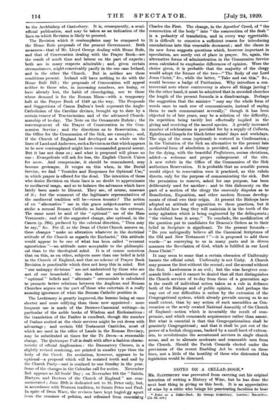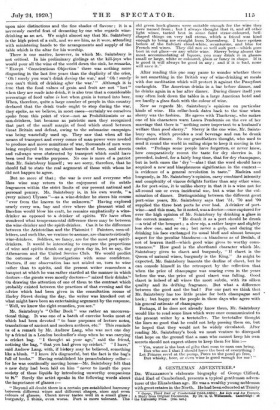NOTES ON A CEELLAR-BOOK.* Mn. SArwrsstrsv was prevented from carrying
out his original intention of writing a History of Wine, but he has done the next .best thing in giving us this book. It is an appreciation of wine by a critic who brings his penetrating faculties to bear
• Notes on a Cala-Book. By George Saintsbury. London: Macmillan. [7s. 8d. net.]
upon nice distinctions and the fine shades of flavour ; it is a nervously careful feat of decanting by one who regards wine- drinking as an art. We might almost say that Mr. Saintsbury is the high priest of a cult, and we see him, as it were, attending with ministering hands to the arrangements and supply of the table which is the altar for his worship.
There is one matter, however, in which Mr. Saintsbury is not critical. In his preliminary girdings at the kill-joys who would pour all the wine of the world down the sink, he remarks, "Except Conscientious Objection-' there was nothing more disgusting in the last five years than the duplicity of the cries, ' Oh! surely you won't drink during the war,' and ' Oh ! surely you can't think of drinking after the war.'" Although it is -true that the food values of grain and fruit are not " lost " when they are made into drink, it. is also true that a considerable percentage of food value is lost when grain is turned into beer. When, therefore, quite a large number of people in this country declared that the drink trade ought to stop during the war, they spoke, as we believe, in most cases—certainly we ourselves spoke from this point of view—not as Prohibitionists or as non-drinkers, but because as patriotic men they recognized that part of the small margin of food which stood between Great Britain and defeat, owing to the submarine campaign, was being wastefully used up. They saw that when all the means of transport and every mince of man-power were needed to produce and move munitions of war, thousands of men were being employed in moving about barrels of beer, and streets and railways were obstructed by transport which could have been used for warlike purposes. No one is more of a patriot than Mr. Saintsbury himself ; we are sorry, therefore, that he should fail to state the real argument of those with whom he did not happen to agree.
But no more of that ; the war is over and everyone who likes wine may return to the enjoyment of its subtle fragrances within the strict limits of our present national and personal penury. Mr. Saintsbury is, in his own words, "a (very minor) Ulysses "—as a wine-drinker he steers his course "ever from the known to the unknown." Having explored nearly every sea, bay and river where the pleasant wind of Bacchus would blow his craft, he remains emphatically a wine- drinker as opposed to a drinker of spirits. We have often wondered what temperamental difference there may be between the wine-drinker and the spirit-drinker. Can it be the difference between the Aristotelian and the Platonist ? Painters, men-of- letters, and such like, we venture to assume, are characteristically wine-drinkers. Soldiers, we fancy, are for the most part spirit- drinkers. It would be interesting to compare the proportions of wine and spirits drunk on any given day in, let us say, the Athenaeum and the United Service Club. We would predict the outcome of the investigations with some confidence. Doctors, if our observation has not misled us, turn to wine rather than to spirits, and the present writer remembers a banquet at which he was rather startled at the manner in which doctors—the guests were mostly doctors—" mixed their drinks." On drawing the attention of one of them to the contrast which probably existed between the practices of that evening and the advice which had been given in the consultation rooms of Harley Street during the day, the writer was knocked out of what might have been an entertaining argument by the response, "Well, we know the right remedies, you see."
Mr. Saintsbury's "Cellar Book" was rather an unconven- tional thing. It was one of a batch of exercise books most of which had been devoted "to base purposes of lecture notes, translations of ancient and modern authors, etc." This reminds us of a remark by Mr. Andrew Lang, who was met one day by a friend in a London bookseller's shop when he was carrying a cricket bag. "I thought at your age," said the friend, noticing the bag, "that you had given up cricket." "I have," said Andrew Lang, with, if history may be believed, something like a blush. "I know it's disgraceful, but the fact is the bag's full of books." Having established his preambulatory cellar— for he was continually moving house—Mr. Saintsbury felt that a new duty had been laid on him "never to insult the pure society of these liquids by introducing unworthy companions to it." Surely the artist speaks in the following words about the importance of glasses :— "Beyond all doubt there is a certain pre-established harmony between different wines and different shapes, sizes and even colours of glasses. Claret never tastes well in a small glass ; burgundy, I think, even worse. Port is more tolerant. The
old green hock-glasses were suitable enough for the wine they were named from ; but I always thought that it, and all other light wines, tasted best in some faint straw-coloured, bell- shaped things on very tall stems, which a friend was kind enough to bring me straight from Nuremberg. I have spoken before of the Salviati cloud-white, avanturine, and blue for French red wines. They did not so well suit port—Which goes best in cut glass—or any white wine. Sherry being almost the most accommodating of liquors, you may drink it in glasses small or large, white or coloured, plain or fancy in shape. If it is good it will always be good in any ; and if it is bad, none will save it."
After reading this pm may pause to wonder whether there is not something in the British way of wine-drinking at meals with due meditation which will protect it against the Pussyfoot onslaughts. The American drinks in a bar before dinner, and he drinks again in a bar after dinner. During dinner itself you may often look down the tables in a large American hotel and see hardly a glass flash with the colour of wine.
Now as regards Mr. Saintsbury's opinions on particular kinds of wine. His cellar-book dates back to the time when sherry was the fashion. He agrees with Thackeray, who makes one of his characters warn Laura Pendennis on the eve of her marriage that there is "nothing more important to a husband's welfare than good sherry." Sherry is the one wine, Mr. Saints- bury says, which provides a real beverage and can be drunk throughout dinner. So our grandfathers thought, who used to send it round the world in sailing ships to keep it moving in the
casks. "Perhaps some people have forgotten, or never knew, how comparatively recent the taste for dry sherries is. It preceded, indeed, for a fairly long time, that for dry champagne,
but in both cases the dry '—alas ! that the word should have acquired a new and blasphemous signification in the context—
is evidence of a general revolution in taste." Madeira and burgundy, in Mr. Saintsbury's opinion, carry combined intensity and complexity of vinous delights further than any other wine.
As for port-wine, it is unlike sherry in that it is a, wine not for all-round use or even incidental use, but a wine for the cul- mination of dinner. Distinguishing between the different great port-wine years, Mr. Saintsbury says that '51, '70 and '90
supplied the three best ports he ever had. A drinker of port- wine—and this man, be it noted, was a doctor—once captured for ever the high opinion of Mr. Saintsbury by drinking a glass in the correct manner. "He drank it as a port should be drunk —a trial of the bouquet ; a slow sip, a rather larger and slightly less slow one, and so on ; but never a gulp, and during the drinking his face exchanged its usual bluff and almost brusque aspect for the peculiar blandness—a blandness as of Beulah, if not of heaven itself—which good wine gives to worthy coun- tenances." How good is the shorthand character which Mr. Saintsbury gives to claret and burgundy, "If claret is the Queen of natural wines, burgundy is the King." As might be expected, Mr. Saintsbury laments the decline of claret, but he
can console himself in the retrospect by the reflection that when the price of champagne was soaring even in the years before the war, the price of good claret was falling. Good claret is indeed of all wines the most subtle, with its silken quality and its drifting fragrance. But what a difference between the good and the bad ! For our part we think that Mr. Saintsbury has too little praise for both champagne and • hock ; but happy are the people in these days who agree with his general estimate of champagne.
Perhaps, if he does not already know them, Mr. Saintsbury would like to read some lines which were once communicated to the present writer by a teetotaller. The teetotaller thought the lines so good that he could not help passing them on, but he hoped that they would not be widely circulated. After reading Mr. Saintsbury's book we must venture to disregard that hope on the ground that a man who cannot keep his own secrets should not expect others to keep them for him :—
"Yes, water is the best of gifts that man to man can bring. But who am I that I should have the best of everything ? Let Princes revel at the pump, Peers to the pond go free, But whisky, beer, or even wine is good enough for me ! "



































 Previous page
Previous page